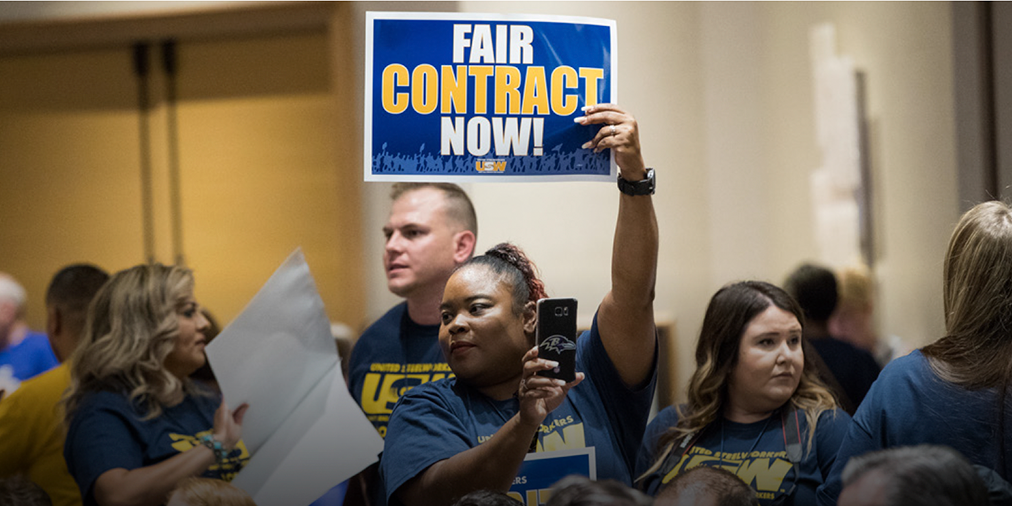At the first meeting of the national bargaining subcommittee on economics on Monday, May 17, Alliance leaders told senior KP executives we expect negotiations to result in excellent National and Local Agreements.
Alliance Executive Director Hal Ruddick introduced some of our economic interests: strong, common wage increases across all regions; improving wages and benefits in areas that are below standards; improving and updating benefits; insourcing jobs; supporting career development with student loan assistance, improved tuition reimbursement, and upward mobility within KP.
“We made a strong case for a great contract based on the principles of best jobs and best care,” said Michael Barnett, the newly elected president of USW Local 7600.
“Our members delivered under extraordinary conditions, and KP is now emerging from the pandemic in a very strong financial position,” said Ruddick. “We expect that our shared success will be reflected in the national and local agreements we are negotiating.”
Nate Bernstein of UFCW noted that despite pandemic costs, KP has had consistent, healthy operating margins. KP has brought in $16.3 billion in net profits between 2018 and 2020. KP membership grew by 591,000 over three years — then jumped an additional 129,000 in the first quarter of 2021. “KP is a healthy, profitable, growing organization,” he said.
As we’ve done in partnership for decades, during the pandemic we provided the best care anywhere, collaborating on new workflows, redeploying, and filling needed roles and extra shifts. We were innovative and flexible. We partnered on PPE and were among the first to volunteer to test and vaccinate our communities. Even as we grieve our lost co-workers, family, and patients, we are proud of our contributions — and the public is grateful for our service.
We expect to continue beating the competition by innovating in partnership. “Right now, KP competitors such as Aetna-CVS/Minute Clinic are innovating by employing Advanced Practice Providers more widely — and KP has a huge opportunity for similar savings,” said Ruddick.
“We suggested many other ways we should innovate together: strengthen UBTs, accelerate technology, make better use of telehealth, expand service and access, internalize jobs and reduce use of costly outside providers/vendors,” said OFNHP president Jodi Barschow. “If we want innovation and a sustainable, viable, competitive enterprise, KP needs to engage with labor at the initial stages — not just call us when they think they have a solution and they want us to implement it.”
“We gave them real-world examples demonstrating that successful innovation is based on new care models and new technology, improved convenience and access, new ways of integrating care, and better quality — not lower wages,” said Bernstein.
“Partnership builds consensus and speeds real innovation. Lack of partnership breeds resistance and failure,” said the Alliance presentation.
“We’re proud of our contributions. KP is rated number one on 52 quality measures, we have 31 hospitals rated high-performing, and have Medicare 5-Star Ratings in seven regions,” said Barschow. “We aim for and achieve the best: the best care and the best jobs.”
We expect that management will make their opening presentation at the next meeting of the economic sub-committee on June 2.
In the last two weeks, all five national bargaining sub-committees met and began outlining their scope of work. Here is a brief description of each sub-committee:
- Problem and Dispute Resolution: Our objective is to resolve disagreements faster —at the national, local, and department level.
- Staffing, Backfill and Travelers: We will identify solutions for issues related to staffing, backfill, and travelers, including ensuring partnership engagement on overall strategy in position control, budgeting, workforce planning, and benchmarking.
- Patient & Worker Safety: We aim to create the safest environment in healthcare for patients and workers, including promoting just culture principles.
- Racial Justice: Our goal is to eliminate disparate health outcomes based on race, win wage justice for all, and embed racial equity and belonging in the workplace.

